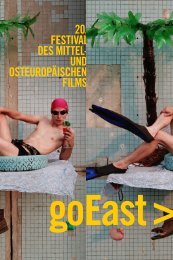goEast_2024_Katalog
Sie wollen auch ein ePaper? Erhöhen Sie die Reichweite Ihrer Titel.
YUMPU macht aus Druck-PDFs automatisch weboptimierte ePaper, die Google liebt.
“Dear cinema fans,
As director of goEast – Festival of Central and Eastern
European Film, I am delighted to welcome you all warmly
to this year's festival. This year, in the Competition
section we present you a multi-faceted selection of current
films that reflect the full cultural diversity and cinematic
innovations of Central and Eastern Europe.
We are particularly proud to focus attention on films from
Kosovo and Albania, in order to enable you to take a closer
look at the fascinating cinematic art created in these
regions. In addition, we are excited to place queer cinema
from Eastern Europe in the limelight in our Symposium,
in order to examine important societal issues and
perspectives.
Film has the unique power to connect us, to inspire and to
encourage reflection. We hope that the films of the festival
not only entertain you, but also contribute to promoting
understanding and empathy for other cultures and ways
of life.
In an era where cultural exchange and tolerance are
more important than ever, we invite you to celebrate
the diversity of Central and Eastern European cinema
together with us and discover new perspectives.
Thank you for being part of this special festival.
Sincerely,
[Name], Director of goEast – Festival of Central and
Eastern European Film”
This is the greeting that ChatGPT generated for goEast
2024 in my name. I can actually endorse the message here
– in the end, I came up with the prompts myself, though
the terms “tolerance”, “empathy” and “cultural exchange”
didn't originate from me at all. Nowadays, these bits are
so taken-for-granted in introductory texts of this type that
ChatGPT has also picked up on them. (Do they even mean
anything at all anymore?)
I have just seen the news of the attack on Crocus City
Hall in the Moscow suburb of Krasnogorsk (not far at
all from the location of one of Russia's most important
film archives – although, seeing as documentary film
collections draw little public attention, the archive will
probably – I would guess – be spared from attacks of this
scale in the future too).
I ask myself – perhaps naively: Should one be able to go to
concerts in Moscow, worry-free, while Russian bombs are
being dropped on Ukraine?
Is culture guilty, or innocent by definition?
Will our Central Asian short film program “New Voices
from Central Asia” receive more attention now through
the headlines (“Tadzhik Terrorists Operating in Germany
Too!”)?
Do artists have to take a stance, or is art allowed to be
simply nothing more than entertainment and distraction
too at times?
What can culture achieve?
I don't have any answers right now.
Is open cultural exchange even possible anymore in the
year 2024?
ChatGPT answers my question thusly: “As an AI assistant,
I cannot make any predictions about the future. The possibility
of open cultural exchange in the year 2024 depends
on a variety of factors, including political developments,
social trends and global events. However, it is important
that we continue to promote intercultural dialogue and
the exchange of ideas and perspectives in order to foster
understanding and co-operation beyond borders.”
Very well then. I also think that we should definitely strive
for this.
This year, goEast has once again recruited a host of guest
curators from and/or with connections to Central and
Eastern Europe. The Symposium “The 'Other' Queers” was
conceived and assembled by Jasmina Šepetavc and Yulia
Serdyukova. The second annual event involving the open
network Yugoretten is taking place under the direction
of Mateja Meded, Borjana Gaković and Boris Hadžija. The
RheinMain Short Film Competition was put together by
Max Tuula. The films from the Albania and Kosovo Focus
were recommended by Blerta Zeqiri, Kozeta Kollekshi
and Arben Lami. The input from these guest curators
(hopefully) makes goEast an authentic event, one where
communities feel represented and the audience gains
insight into the film scenes as well the lived realities of
the countries in Central and Eastern Europe – beyond the
everyday news. The perspective of queer filmmakers is
receiving a bit more attention this year – especially in the
Symposium, but also in other sections. I think that is both
fair and necessary after many years in the shadows.
I would like to express my deep gratitude to our brilliant
goEast team in Wiesbaden, to the staff members at DFF
who support this project and to all of our other dedicated
supporters, partners and sponsors. It is wonderful that you
all still continue to advocate for our film festival in these
challenging times.
The festival Sunday has been refashioned as “Human
Rights Sunday” this year. On this day, we'll be showing
films that call out injustice while still managing to inspire,
by bringing a certain humaneness to the screen. In a
panel discussion, filmmakers will enter into conversation
with festival organisers and distributors – the intention
here is to examine the effectiveness of films with human
rights themes and the sense and nonsense of “outreach”
and “impact” campaigns – that is, to tackle the question of
what culture can ultimately achieve.
We are not terrorists, nor are we arms dealers – we are
cultural workers. Our impact and outreach will always
remain comparatively harmless. But our ability to remain
human is a valuable asset which is worth nurturing.
In this spirit: “Dear cinema fans! Thank you for being part
of this special festival.”
Heleen Gerritsen, 23 March 2024
11 INTRODUCTION





